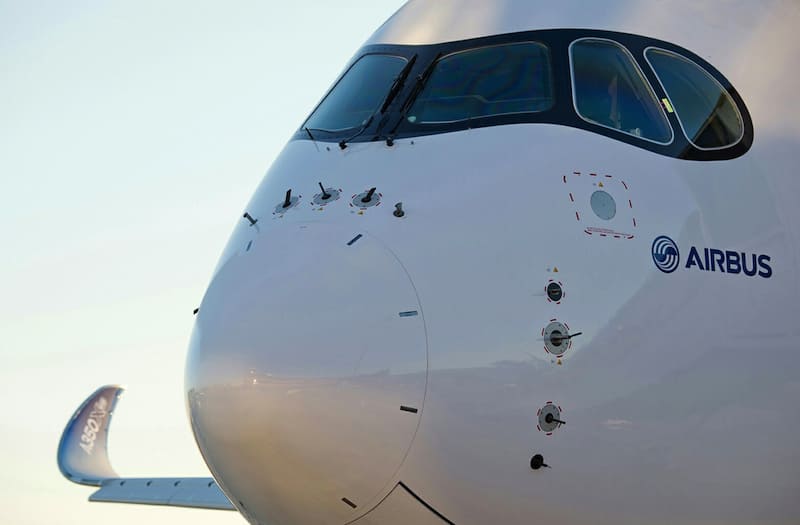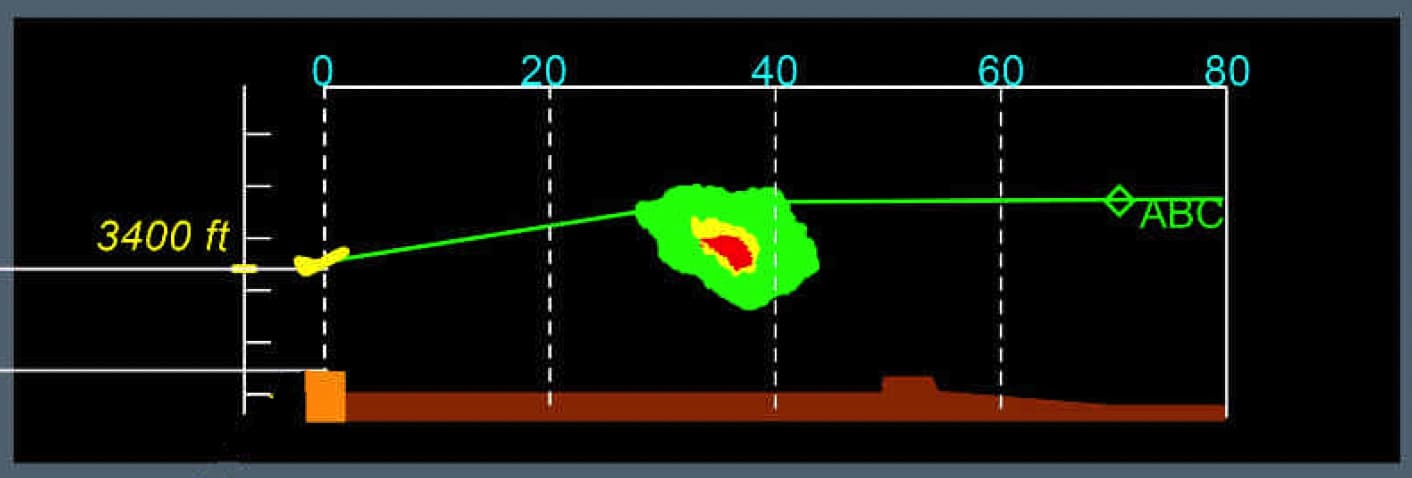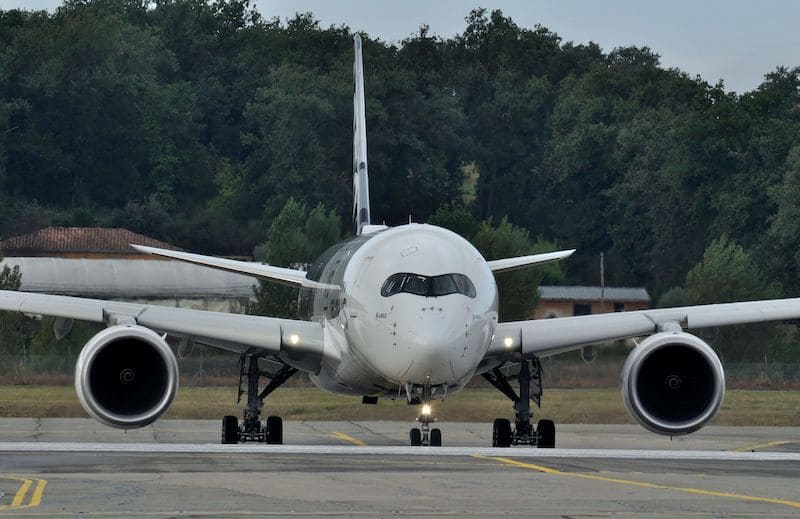Airbus A350 - Navigation
The Multi Function Probes (MFPs) provide:
 H.Gousse
H.Gousse
The IR starts a fast alignment, when the flight crew sets the IR mode selector from NAV to OFF, and then back to NAV within _____.
ADIRS ALIGNMENT - During a complete alignment, the IR checks the GNSS position (or the manually-entered position) with:
Each FADEC monitors the computed air data from the three ADIRUs, the ISIS, and the engine sensors, for its air data selection.
The PRIMs use the ADIRUs for the flight control laws.
AIRPORT NAVIGATION SURVEILLANCE - The ANF displays the indications of the runway approaching advisory on:
RADIO ALTIMETER (CONTROLS AND INDICATORS) -The VD displays the ground elevation when the aircraft is below _____.

AIR DATA SOURCE AND DISPLAY RECONFIGURATION - With the ISIS system that is independent from the ADIRS, the aircraft has four fully segregated sources of air data.
The ADIRS has three fully segregated sources of air data parameters. The ISIS is the fourth one.
AIRPORT NAVIGATION SURVEILLANCE - The airport moving map is available when the flight crew sets the ND range selector to the ZOOM position, in:
Each MFP sends a raw measurement of the AOA to the ADIRS for the Gust Load Alleviation (GLA) function
Each MFP sends a raw measurement of the AOA to the PRIMs for the Gust Load Alleviation (GLA) function
EVALUATION OF NAVIGATION ACCURACY - The aircraft is in NAV PRIMARY, when:
There are _____ Multi Function Probes (MFPs).
One MFP is on the left side of the aircraft, and the two other MFPs are on the right side of the aircraft.
Advertisement
The static probes provide the local static pressure. The static probes provide the local static pressure. There are _____ static probes.
Three static probes are on the right side of the aircraft, and three others are on the left side of the aircraft.
The static probes provide the local static pressure. Each ADIRU is connected to two static probes, one on each side of the fuselage.
ATT mode is the abnormal mode of operation of the IR. In ATT mode, the IR only provides the attitude and the heading data.
The heading data is only available after the flight crew enters the current heading on the FMS POSITION/IRS page of the MFD.
A complete alignment is only possible between 82 degrees N and 82 degrees S.
A complete alignment is only possible between 82 degrees N and 78 degrees S.
Each ADIRU is connected to one MFP.
ATT ONLY OPERATION - In the case of a short power shutdown of an ADIRU, or an IR failure, the NAV and ATT modes are both lost.
In the case of a short power shutdown of an ADIRU, or an IR failure, the NAV mode is lost. However, the ATT mode will probably be available.
REQUIRED NAVIGATION PERFORMANCE (RNP) - The FMS uses the RNP value, together with the EPU, to define the navigation accuracy. The FMS has a default RNP value. For the approach flight segment, the RNP value is:
The ISIS uses three dedicated probes that are independent of the ADIRS probes.
IR ALIGNMENT - The alignment during engine start or while engines are running is not possible.
The alignment during engine start or while engines are running is possible without restriction: to perform an alignment, the aircraft must be stopped. In the case of aircraft movement during the IRS alignment, the flight crew must perform a new full alignment.
The PFDs display the ISIS speed indication or the ISIS altitude indication, when the automatic monitoring of air data (by the PRIMs and the ADIRS) rejects the speed or the altitude of _____.
The Outside Air Temperature (OAT) probes provide the static air temperature on ground, during takeoff and landing. There are two OAT probes. The OAT probes are located:
If the NAV PRIMARY LOST message appears on the MFD (in the FMS message area) and on the ND, the automatic position reporting of the ADS-B function is lost.
During a non-precision approach that is flown with the FLS function, the NAV PRIMARY LOST condition degrades the FLS capability. The triple-click audio indicator sounds.
Advertisement
RADIO ALTIMETER (CONTROLS AND INDICATORS) - The PFD displays the ground elevation when the aircraft is below _____
When the aircraft enters the polar zone:
The SELECT TRUE NORTH REF message appears on the ND and the MFD when the aircraft approaches the polar zone (not when it enters).
ADIRS ALIGNMENT - When the IR starts a complete alignment, the IR initializes the aircraft position. If the GNSS is not available, or if the flight crew wants to override the automatic initialization, manual initialization is possible, at any moment during the alignment phase.
To perform manual initialization, the flight crew must enter the required position on the POSITION/IRS page of the MFD.
A complete alignment lasts _____, depending on the aircraft latitude.
Each Multi Mode Receiver (MMR) enables:

AIRPORT NAVIGATION SURVEILLANCE (RUNWAY APPROACHING ADVISORY) - The ANF provides the flight crew with several advisories and information. During taxi, the runway approaching advisory warns the flight crew that the aircraft is near a runway, or a runway intersection. The ANF triggers the runway approaching advisory _____ before the aircraft enters the runway area.
ADIRU 1 provides the aircraft position to FMS 2, and ADIRU 2 provides the aircraft position to FMS 1.
ADIRU 1 provides the aircraft position to FMS 1, and ADIRU 2 provides the aircraft position to FMS 2.
AIRPORT NAVIGATION SURVEILLANCE - At landing, regardless of the position of the ND mode selector and the ND range selector, the airport moving map appears in ARC mode with a 1 NM or 2 NM range in order to entirely display the runway that is ahead of the aircraft.
GNSS, LOC and GS antennas provide navigation data to Multi Mode Receivers (MMRs).
EVALUATION OF NAVIGATION ACCURACY - The FMS continuously compares the current EPU from the ADIRS with the current RNP, and defines the navigation accuracy as:
The aircraft has two independent Airport Navigation Functions (ANFs) but only one database.
The aircraft has two ANF databases. An ANF database is loaded in both CAPT and F/O outer display units.
